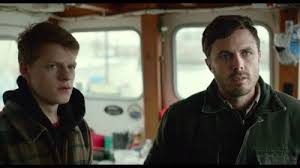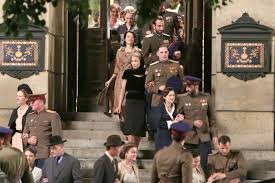YOU CAN’T GO HOME AGAIN: Movie Reviews of Manchester By The Sea, It’s Only the End of the World and The Commune by Howard Casner
Posted: November 29, 2016 | Author: Donald | Filed under: Uncategorized | Tags: C.J. Wilson, Casey Affleck, Gretchen Moll, It’s Only the End of the World, Jean-Luc Lagarce, Kenneth Lonergan, Kyle Chandler, Lea Seydoux, Lucas Hedges, Marion Cotillard, Matt Damon, Matthew Broderick, Michelle Williams, Nathalie Baye, The Commune, Thomas Vinterberg, Tobias Lindholm, Trine Dryholm, Ulrich Thomson, Vincent Cassel, Xavier Dolan | 16 Comments »For questions: hcasner@aol.com
First, a word from our sponsors: I am now offering a new service: so much emphasis has been given lately to the importance of the opening of your screenplay, I now offer coverage for the first twenty pages at the cost of $20.00. For those who don’t want to have full coverage on their screenplay at this time, but want to know how well their script is working with the opening pages, this is perfect for you. I’ll help you not lose the reader on page one.
Ever wonder what a reader for a contest or agency thinks when he reads your screenplay? Check out my new e-book published on Amazon: Rantings and Ravings of a Screenplay Reader, including my series of essays, What I Learned Reading for Contests This Year, and my film reviews of 2013. Only $2.99. http://ow.ly/xN31r
and check out my Script Consultation Services: http://ow.ly/HPxKE
Warning: SPOILERS
 You Can’t Go Home Again is, of course, the title of a posthumously published novel by Thomas Wolfe, and a phrase that has entered common discourse since. I’ve seen three movies lately that are about people returning home or using memories of their early years as the basis for their stories.
You Can’t Go Home Again is, of course, the title of a posthumously published novel by Thomas Wolfe, and a phrase that has entered common discourse since. I’ve seen three movies lately that are about people returning home or using memories of their early years as the basis for their stories.
The basic premise of writer/director Kenneth Lonergan’s new film Manchester by the Sea revolves around Lee Chandler (Casey Affleck), a janitor living in Boston who is very good at his job, but is a loner with a somewhat self-destructive personality. When he receives word that his older brother Joe (Kyle Chandler) has died, he returns to his home city of Manchester by the Sea, a fishing and tourist town. There he is shocked to discover that his brother in his will has requested Lee to become guardian to Joe’s sixteen year old son, Lucas. Joe has provided for Lucas’ expenses in his will and just needs Lee to return to Manchester to live.
Why Lee can’t return and the conflicts over how to handle this request make up the bulk of the movie and much of the heart breaking suspense is waiting to find out what happened that led to Lee’s present situation-you know it has something to do with his three children since they are only shown in flashback. The waiting is painfully unbearable at times. Read the rest of this entry »
IT’S NOT THE SIZE, IT’S WHAT YOU DO WITH IT: Movie reviews of Child 44 and Unfriended by Howard Casner
Posted: April 20, 2015 | Author: Donald | Filed under: Uncategorized | Tags: Child 44, Daniel Espinoza, Fares Fares, Gary Oldman, Jacob Wysocki, Jason Clarke, Joel Kinnamen, Levan Gabriadze, Nelson Greaves, Noomi Rapace, Paddy Considine, Richard Price, Tom Hardy, Tom Rob Smith, Vincent Cassel | 234 Comments »First, a word from our sponsors. Ever wonder what a reader for a contest or agency thinks when he reads your screenplay? Check out my new e-book published on Amazon: Rantings and Ravings of a Screenplay Reader, including my series of essays, What I Learned Reading for Contests This Year, and my film reviews of 2013. Only $2.99. http://ow.ly/xN31r
and check out my Script Consultation Services: http://ow.ly/HPxKE
Warning: SPOILERS
 Child 44, the new mystery thriller that is about the hunt for a serial killer in post-World War II Soviet Union, has received terrible reviews. I mean, horrendous in some cases. It’s at 25% at rottentomatoes. And very few, so far, have had much too good to say about it.
Child 44, the new mystery thriller that is about the hunt for a serial killer in post-World War II Soviet Union, has received terrible reviews. I mean, horrendous in some cases. It’s at 25% at rottentomatoes. And very few, so far, have had much too good to say about it.
Well, I’m here to suggest that maybe the movie is being a bit maligned.
That is not to say I think it’s great. I definitely do not believe it quite succeeds on its own terms or rises above what it is.
And it’s also possible that I went in expecting the worst, only to be pleasantly surprised. That’s certainly happened to all of us at one time or another.
But still, I think there is much to like here, especially if you are a fan of neo-noir or crime dramas. Read the rest of this entry »
Movie Review of Oz The Great and Powerful and The Monk by Howard Casner
Posted: March 13, 2013 | Author: Donald | Filed under: Uncategorized | Tags: Anne-Louise Trividic, David Lindsay-Abaire, Dominik Moll, James Franco, Michelle Williams, Mila Kunis, Mitchell Kapner, Oz The Great and Powerful, Rachel Weisz, Sam Raimi, Sergi Lopez, The Monk, Vincent Cassel, Zach Braf | 3 Comments »Oz The Great and Powerful, the new fantasy film written by Mitchell Kapner and David Lindsay-Abaire and directed, for some reason, by Sam Raimi, is a movie about a man with Peter Pan syndrome and has commitment issues who ends up in a land far, far away where he gets caught up in a cat fight between three woman (Michelle Williams, Mila Kunis and Rachel Weisz) who are jealous of each other’s looks and/or the man in their lives. Yes, that’s about as much imagination as is shown in this conglomeration culled from the characters in the books of Frank L. Baum (of The Wizard of Oz fame).
It’s also a movie starring the incredibly, if not profoundly, miscast James Franco (easily as miscast as he was as host of the Oscars) in the titular role. It’s a movie in which every scene is designed for maximum 3-D effect, while the scenery, characters and dialog are as flat as Franco’s acting (and with backgrounds that have rarely looked as much like matte drawings as they do here). It’s a movie in which Zach Braf, a former romantic lead of such outings as Scrubs, Garden State and The Last Kiss, has fallen to such depths as to be cast in a second lead, as a flying monkey no less, yet he still steals every single scene he is in.
And finally, it’s a movie that can’t have a satisfactory ending because the filmmakers have painted themselves into a corner. The only truly dramatically satisfactory resolution is for Oz to return to Kansas to save former girlfriend Annie (Michelle Williams) from a loveless marriage. But he can’t leave Oz because he’s got to be there when Dorothy arrives. But his character arc needs to be resolved, so he ends up kissing Glinda (also played by Michelle Williams, and I suppose that from the filmmakers’ points of view, one woman is the same as another, so it really doesn’t matter if Oz ends up with Annie or Glinda as long as they are played by the same actress), but we know that this relationship can’t last because there’s no such relationship when D-girl arrives. And isn’t there something just a little creepy in that a lead character in a family film is awarded with sex for saving the day?
Oz The Great and Powerful doesn’t work. It’s unimaginative in design, acting, direction and writing. Perhaps it’s best to say that it’s a movie that is no Jack the Giant Slayer and let it go at that.
Meanwhile, The Monk is also about a character that is also supposed to be charismatic and inspiring. It’s the new movie written by Dominik Moll (who also directed) and Anne-Louise Trividic. Moll also directed the highly recommended films With a Friend Like Harry… and Lemming and there seems to be a theme here—that of some evil or perverseness worming its way into a seemingly safe situation.
The Monk is about, well, this monk Ambrosio who lived in Spain in the late 18th century. He’s very popular. His sermons draw SRO crowds. I have to be honest, I wasn’t exactly sure why. His homilies are pretty doom and gloomy stuff and the character, as played by Vincent Cassel, is not the most charismatic of preachers. He’s actually much better at confession where he’s able to cut through bullshit with a butter knife.
Ambrosio’s main philosophical point is that Satan has no more power over any of us than we can stand. I guess that was too much of a Job like statement, because it’s not long before Satan (played by Sergi Lopez, one of the go to guys for playing the devil these days, I guess) arrives to take up the gauntlet the monk has thrown him (Lopez is actually in the opening scene, which in many ways kind of demonstrates one of the structural weaknesses of the story—since the audience doesn’t know this is Satan, it never gets related to the rest of the story until the movie’s over, which isn’t very satisfactory). But at any rate, Satan sends evil to the monastery and since this is based on a Catholic novel written in 1796, evil must arrive in the form of a woman. And Ambrosio’s beliefs are quickly proved wrong because Satan’s power is greater than the father can withstand and Ambrosio is soon heading toward an Oedipal like tragic ending.
But the movie never quite worked for me mainly because Satan is able to defeat Ambrosio by using magical powers and forcing Ambrosio to do things he would never normally do. Satan’s not the devil here, he’s a Jedi knight. So instead of being emotionally involved in Ambrosio’s downfall, all I could think was, “Hey, that’s cheating”. I guess the whole thing’s suppose to be some sort of metaphor, but if so, it all felt a bit too vague to me until I didn’t know what the moral of the story was supposed to be: beware of Satan because he’s really Yoda?
The real problem with the movie, though, may be the basic structure. It’s a tad all over the place. There are three major through lines and the movie takes a bit too long in bringing them all together (and one never seems satisfactorily integrated). And the movie also tries to implicate the monk for the fate of a young nun, something to which Ambrosio’s guilt is tenuous at best and to which I called “shenanigans”.
I understand that the great prankster filmmaker Louis Bunuel wanted to make a movie of the novel over the years and one can see why. It has all the ingredients that would appeal to someone with the impious sensibility of that anti-Catholic filmmaker. And he quite possibly would have been able to bring a certain perverse vision to the material that might have been more successful. But for me, this movie is just a slight misstep in Moll’s career.











